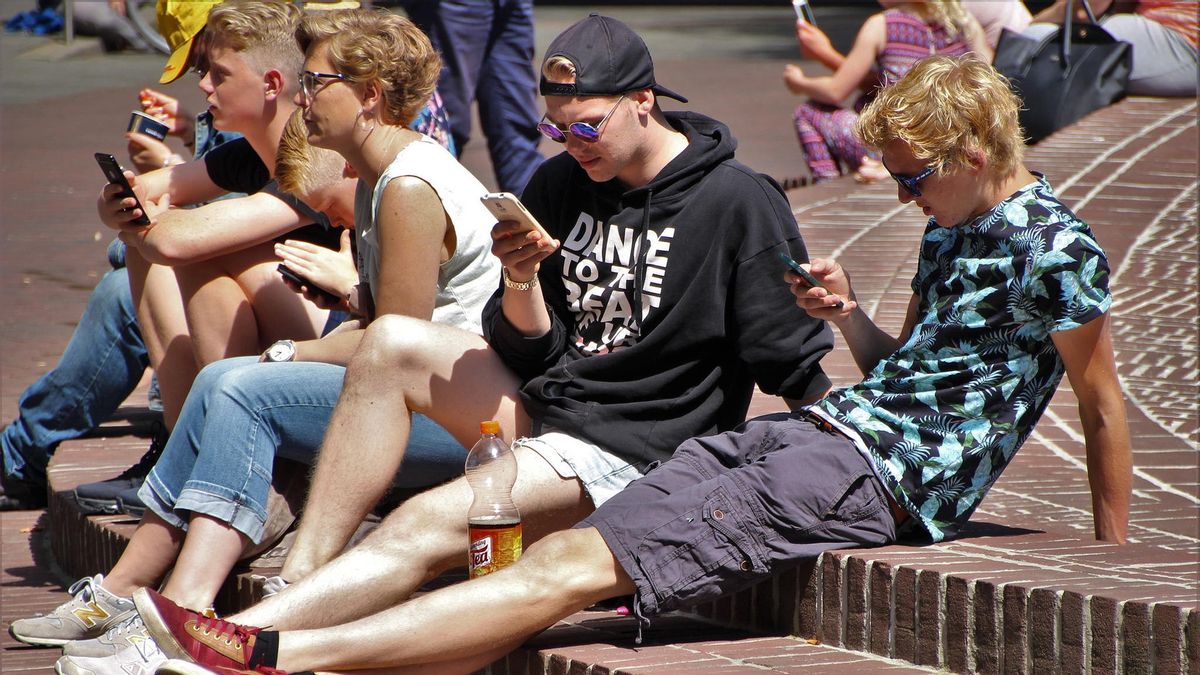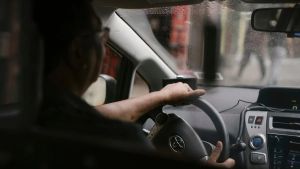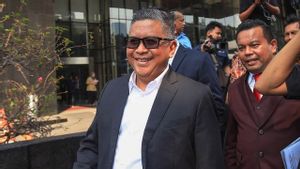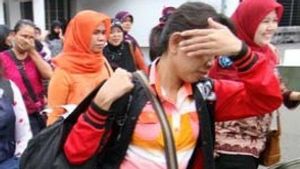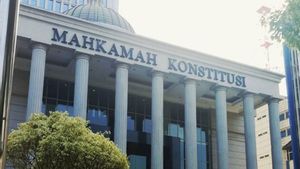JAKARTA - President Joko Widodo (Jokowi) opens the opportunity to revise Law Number 19 of 2016 concerning Electronic Information and Transactions (UU ITE) which is considered to have many rubber articles.
The discourse on the revision of the ITE Law was conveyed by President Jokowi at the opening of the TNI and Polri Leadership Meeting at the State Palace, Jakarta. Through a broadcast uploaded to the Presidential Secretariat YouTube on Monday, February 15, the former governor of DKI Jakarta asked National Police Chief Listyo Sigit Prabowo to be careful in handling reporting using the ITE Law.
In addition, he said, the ITE Law is considered not to provide justice, so the government will propose a revision of the law which is often seen as restricting freedom of expression.
"If the ITE Law cannot provide a sense of justice, yes, I will ask the DPR to jointly revise this law. This ITE Law. Because this is where the upstream went. The upstream is here. Revision," said Jokowi in front of him. the TNI and Polri Rapim participants.
"Especially removing rubber articles which can have different interpretations. Which are easy to interpret unilaterally," he added.
Coordinating Minister for Political, Legal and Security Affairs (Menko Polhukam) Mahfud MD, via his Twitter account @mohmahfudmd, said the government would hold discussions regarding the initiative to revise this law. This also answers public concerns with the existence of the rubber article in the ITE Law.
"If now the law is deemed bad and contains rubber articles, let's make a new resultant by revising the law. How good is it, this is democracy," wrote Mahfud.
A number of parties in the DPR supportThe discourse on the revision of the ITE Law was later responded by a number of parties in the Indonesian Parliament. PKS through Commission I DPR RI member Sukamta expressed its approval if the government wanted to change this law.
He said, if this revision was carried out this would be in accordance with the views of those who have often proposed revisions to the ITE Law in the Prolegnas Bill.
"This plan is in line with our view that in recent years proposed a revision of the ITE Law in the Prolegnas Bill, although it ran aground due to a lack of support in the parliament. Therefore, we welcome and strongly agree with the plan to revise the ITE Law," he said in a written statement to reporters, Tuesday. , February 16th.
Changes in the ITE Law, he continued, could provide a sense of justice and comfort in the community even though this was a little late. Because, if this revision has been discussed between the government and the DPR for a year or two of discussion, the new ITE Law can only be implemented in 2023 or 2024 at the end of President Jokowi's term.
Appreciation and support was also conveyed by the PAN Faction which considered that there was a rubber article in the law.
"The PAN faction would be happy if the government initiated the amendment of the ITE Law. Usually, if the government proposes it, the bureaucracy will be easier to implement. Moreover, the substance of the changes is clear. In the DPR of course there will not be much questioning anymore," said the Chairman of the PAN faction DPR DPR. RI Saleh Partaonan Daulay.
He said that all factions in the DPR RI actually saw the urgency of revising the ITE Law. So, he was sure that when the government submitted the proposal to the parliament it would be approved by the majority of the factions.
Meanwhile, DPR member from the PDI-P faction TB Hasanuddin said that the government really wants to revise this law so that its parties will be open. However, as the Head of the previous revision of the ITE Law, he considered that there was an opinion that it was inappropriate if this law was considered to contain a rubber article.
He confirmed that so far, there were two articles that were often debated, namely Article 27 Paragraph 3 and Article 28 Paragraph 2.
It's just that Article 27 Paragraph 3 which contains insults and defamation have referred to and is in accordance with Articles 310 and 311 of the Criminal Code (KUHP). Meanwhile, Article 28 Paragraph 2 concerning broadcasting hatred to people or groups of people based on SARA.
So, Hasanuddin said, these two articles need to be paid close attention to by law enforcement officials so that there are no errors in their application.
Moreover, Article 27 should be a complaint offense so that those who feel aggrieved can report it and the complainant must be not someone else.
Not only that, Hasanuddin also explained that the application of Article 27 Paragraph 2 must be distinguished between criticism and hate speech and insults. This also applies to the application of Article 28 Paragraph 3 of the ITE Law.
"If criticism and hate speech are mixed, then I think the law in this country is no longer healthy," he said.
The firmness that the ITE Law does not contain a rubber article, said Hasanuddin, is also based on the Judicial Review decision at the Constitutional Court (MK) on these two articles. "The result (at that time, red) was no problem," he said.
9 Rubber articles that must be revisedIn the future, if the government is serious, SAFEnet will then note the nine rubber articles that must be removed and corrected from the law. This was conveyed by the Executive Director of SAFEnet Damar Juniarto who responded to Mahfud MD's statement via his Twitter account.
"Prof. @mohmahfudmd, I suggest starting from the 9 problematic articles of the ITE Law. The main problem is articles 27-29 of the ITE Law. This must be removed because of the rubber formula and there is legal duplication. Apart from that there are also other articles that are prone to problems / misuse and need. corrected the formula, "he wrote in the account @DamarJuniarto.
Quoting from the SAFEnet report, the rubber articles in the ITE Law are obliged to be revised because they have multiple interpretations, can cause social impacts, and some of them can even ensnare people's freedom of expression. The nine articles are:
Article 26 Paragraph 3 concerning Deletion of Irrelevant Information. This article is problematic about censorship of information. Article 27 Paragraph 1 concerning Asus. Vulnerable to be used to punish victims of gender based violence online Article 27 paragraph 3 regarding Defamation. Vulnerable to be used for the repression of legal expressions of citizens, activists, journalists / media, and the repression of citizens who criticize the government, police and the president. Article 28 Paragraph 2 concerning Hate Speech. Vulnerable to become a means of repression for religious minorities, as well as citizens who criticize the president, police, or the government. Article 29 concerning Threats of Violence. Vulnerable to be used to convict people who want to report to the police. Article 36 concerning Loss. Vulnerable to be picked up to exacerbate the criminal sentence of defamation. Article 40 Paragraph 2 (a) concerning Prohibited Content. Vulnerable as an excuse to shut down the network or become the basis for internet shutdown on the pretext of cutting off hoax information. Article 40 Paragraph 2 (b) concerning Termination of Access. This article is problematic because it emphasizes that the role of the government takes precedence over court decisions. Article 45 Paragraph 3 concerning the threat of imprisonment for acts of defamation. This article is problematic because it allows detention during an investigation. In addition, this institution specifically noted that there were 324 legal cases that ensnared the public, with the ITE Law as the instrument. All figures were recorded in the period 2016 to October 2020.Of all these articles, Article 27 of the ITE Law is the most dangerous instrument because it is the tool most widely used in bringing someone against the ITE Law. This is followed by Article 28, which is also widely used because it regulates hate speech.
Of the two articles alone, the most people who have sued other people with the ITE Law are public officials, agencies and security forces and the percentage reaches 38 percent. Meanwhile, the victims of the application of the articles of the ITE Law are mostly journalists, activists, residents, artists, and even education personnel.
The English, Chinese, Japanese, Arabic, and French versions are automatically generated by the AI. So there may still be inaccuracies in translating, please always see Indonesian as our main language. (system supported by DigitalSiber.id)
